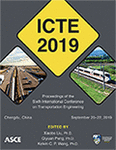Sixth International Conference on Transportation Engineering
Reversed Traffic Assignment for Staggered Shifts with User Equilibrium
Publication: ICTE 2019
ABSTRACT
Staggered shifts are a common traffic demand management, aiming to relieve traffic congestion in peak hour. They move part of traffic demand to a later period, and lead to the original equilibrium state of the system disappearing. Staggered commuters will adjust their home departure time with consideration of renewed work start time and renewed perception or experience of road traffic volume, and some commuters with a relatively late work start time may encounter a more crowded network so they will choose an earlier home departure time, with the final consequence that the system reaches a new equilibrium state. To study the effect of a giving staggered shifts policy on system and commuting behavior, this paper firstly introduces reversed traffic assignment (RTA), then proofs the dual relationship between RTA and forward traffic assignment with user equilibrium, and finally proposes a RTA based model to obtain the transformation of time-varying system state and the commuters’ departure time with consideration of before and after staggered shifts implementation. A numerical test illustrates the model and shows the model can derive the above results with acceptable accuracy. In addition, this study can provide traffic administrations with method to evaluate a giving staggered shifts policy for better management.
Get full access to this chapter
View all available purchase options and get full access to this chapter.
ACKNOWLEDGEMENT
This research was supported by the key project of National Natural Science Foundation of China (Project No.:51338003) and Postgraduate Research & Practice Innovation Program of Jiangsu Province (Project No.: SJCX18_0042). The authors would like to thank the reviews for the valuable comments of this manuscript.
REFERENCES
Beckmann, M. J., Mcguire, C. B., and Winsten, C. B. (1956). Studies in the Economics of Transportation. Yale University Press, New Haven.
Hendrickson, C., and Kocur, G. (2008). “Schedule Delay and Departure Time Decisions in a Deterministic Model.” Transportation Science, 15(1), 62–77.
Komma, A., and Srinivasan, S. (2007). “Modeling home-to-work commute-timing decisions of workers with flexible work schedules.” Transportation Research Record, 08(3055).
LeBlanc, L. J., Morlok, E. K., and Pierskalla, W. P. (1975). “An efficient approach to solving the road network equilibrium traffic assignment problem.” Transportation Research, 9(5), 309–318.
LI, C. Y., HUANG, H. J., and TANG, T. Q. (2017). “Analysis of user equilibrium for staggered shifts in a single-entry traffic corridor with no late arrivals.” Physica A: Statistical Mechanics and its Applications, Elsevier B.V., 474, 8–18.
LI, Shu-Guang. (2004). “The Determination of Optimal Work Start Time.” Transport, 4142(2007), 616–620.
Tencent. (2010). “Does staggered shifts lessen traffic congestion? Beijing’s first day shows little effect.” <http://auto.qq.com/zt/2010/cfsxb/index.htm> (Mar. 1, 2019).
YANG, Xiaoguang, and CHU, Haoran. (2006). “Study on Macro - Travel Impact Analysis of Staggered Shifts.” Journal of Tongji University(Nature Science), 34(7), 899–903.
Yoshimura, M., and Okumura, M. (2001). “Optimal commuting and work start time distribution under flexible work hours system on motor commuting.” Proceedings of the Eastern Asia Society for Transportation Studies, Vol 3, No 2, 455–469.
Yushimito, W. F., BAN, X., and Holguín-Veras, J. (2013). “Correcting the Market Failure in Work Trips with Work Rescheduling: An Analysis Using Bi-level Models for the Firm-workers Interplay.” Networks and Spatial Economics, 15(3), 883–915.
Yushimito, W. F., BAN, X. J., and Holguín-Veras, J. (2014). “A Two-Stage Optimization Model for Staggered Work Hours.” Journal of Intelligent Transportation Systems, 18(4), 410–425.
ZONG, F., JUAN, Z., and JIA, H. (2013). “Examination of staggered shifts impacts on travel behavior: a case study of Beijing, China.” Transport, 28(2), 175–185.
Information & Authors
Information
Published In
ICTE 2019
Pages: 67 - 76
Editors: Xiaobo Liu, Ph.D., Southwest Jiaotong University, Qiyuan Peng, Ph.D., Southwest Jiaotong University, and Kelvin C. P. Wang, Ph.D., Oklahoma State University
ISBN (Online): 978-0-7844-8274-2
Copyright
© 2020 American Society of Civil Engineers.
History
Published online: Jan 13, 2020
Authors
Metrics & Citations
Metrics
Citations
Download citation
If you have the appropriate software installed, you can download article citation data to the citation manager of your choice. Simply select your manager software from the list below and click Download.
